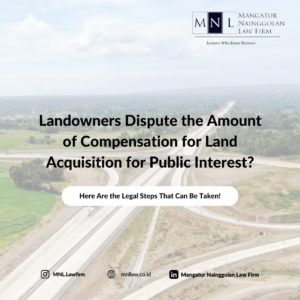
Law Number 2 of 2012 concerning Land Acquisition for Development for Public Interest defines Land Acquisition as the activity of providing land by giving adequate and fair compensation to eligible parties. Public Interest refers to the interests of the nation, state, and society that the government must realize for the prosperity of the people. Land acquisition for public interest is the forcible expropriation of land by the government without the owner’s consent, yet the owner must still be provided with compensation that does not diminish their quality of life.
Fundamentally, land acquisition for public interest is the government’s forcible expropriation of land without the owner’s consent. Despite its coercive nature, providing compensation to landowners must not lead to a decrease in their quality of life after the land is expropriated.
Compensation in land acquisition can take the form of money, replacement land, resettlement, ownership of shares, or other forms agreed upon by both parties (Article 123 number 9 of Law Number 6 of 2023 concerning Job Creation). The amount of compensation is determined based on the assessment results by Land Appraisers, who are Public Appraisers affiliated with a Kantor Jasa Penilai Publik (KJPP). Thus, KJPP bears a heavy responsibility in determining the value of land acquisition objects, forming the basis for determining compensation for affected communities and affecting their welfare and livelihoods.
“Article 1
- Land Appraisers, hereinafter referred to as Appraisers, are individual persons who conduct independent and professional assessments who have obtained assessment practice permits from the Minister of Finance and have been licensed by the Land Agency to calculate the value/price of land acquisition objects.”
Information about the List of KJPP Business Licenses with active status as of January 31, 2024, can be seen on the Financial Profession Development Center website of the Ministry of Finance Secretariat General or at the following link: https://pppk.kemenkeu.go.id/in/post/daftar-kantor-jasa-penilai-publik
- Assessment and Determination of Compensation Process:
-
- The land agency conducts inventory and identification of land possession, ownership, use, and utilization.
- The results of inventory and identification of land possession, ownership, use, and utilization by the land agency must be announced in the village/sub-district office, district office, and land acquisition location within a maximum of 14 working days.
- If there are objections to the inventory results, verification and correction are carried out within a maximum of 14 working days from the receipt of objections to the inventory results.
- The announcement results or verification and correction are determined by the land agency and then become the basis for determining the entitled parties in compensation.
- The land agency determines the Appraiser.
- The Appraiser requests land parcel maps, nominal lists, and necessary data for assessment from the Implementation Chairman of Land Acquisition.
- The Appraiser assesses the land acquisition objects. The assessment of the amount of compensation by the Appraiser is carried out per land parcel based on Article 33 of Law No. 2 of 2012, which includes:
- land;
- space above and below the land;
- buildings;
- plants;
- objects related to the land; and/or
- other assessable losses.
- The Appraiser submits the assessment results through a handover report to the land agency.
- The land agency holds a Compensation Determination Deliberation for a maximum of 30 working days from the Appraiser’s assessment results being submitted to the land agency to determine the form and/or amount of compensation based on the compensation assessment results.
- Results of the Compensation Determination Deliberation:
-
- Agreement Achieved
The results of the deliberations become the basis for providing compensation to entitled parties as documented in the agreement report. - No Agreement Reached
If the landowner disagrees with the amount of compensation determined, they can file an objection to the local District Court (Article 8 paragraph (1) of PERMA No. 3 of 2016) within 14 working days after the compensation determination deliberation. The court will decide on the form and/or amount of compensation within 30 working days. The court’s decision, which has obtained legal force, becomes the basis for payment of compensation to the objecting party.Provisions for filing objections to compensation:
- Agreement Achieved
-
-
- Entitled parties can file objections to the local district court within a maximum of 14 working days after the Compensation Determination Deliberation.
- The district court decides on the form and/or amount of compensation within a maximum of 30 working days from the receipt of objections.
- Parties objecting to the district court’s decision can file cassation to the Supreme Court of the Republic of Indonesia within a maximum of 14 working days.
- The Supreme Court must provide a decision within a maximum of 30 (thirty) working days from the receipt of cassation requests.
- The district court/Supreme Court decision that has obtained legal force becomes the basis for paying compensation to the objecting parties.
-
However, in the deliberation, only the form of compensation is discussed, and there is no deliberation on the amount of compensation. This is based on Article 123 number 8 of Law No. 6 of 2023 Jo. Article 69 paragraph (3) of Government Regulation Number 19 of 2021.
“Article 123
- The amount of Compensation based on the Appraiser’s assessment results as referred to in paragraph (1) is final and binding.”
“Article 69
(3) Th eamount of Compensation based on the Appraiser’s assessment results as referred to in paragraph (2) is final and binding.”
If you require legal consultation, you may contact us through:
mangaturnainggolan.law@gmail.com (email)
081295397825 / 081398941976 (phone)
